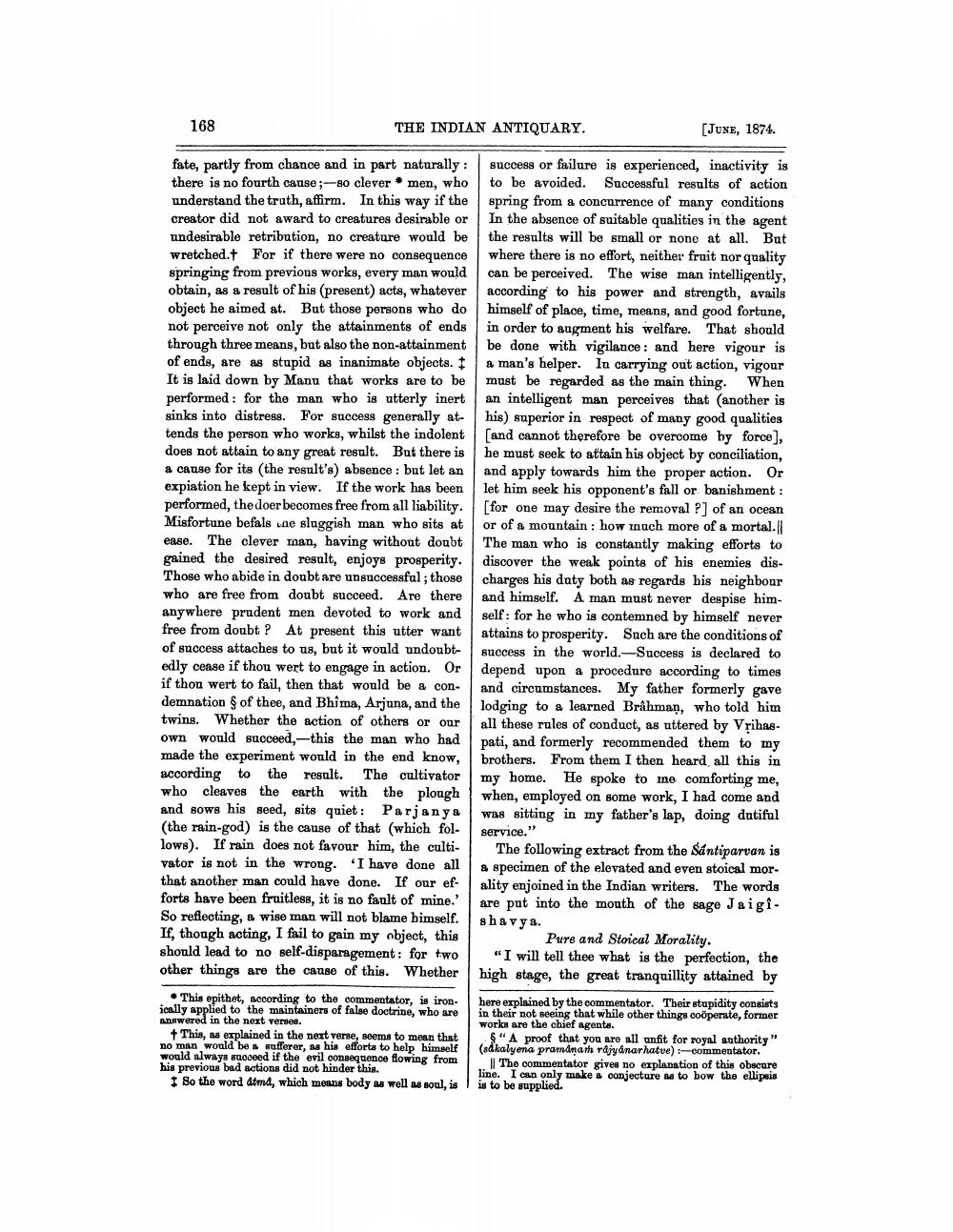________________
168
THE INDIAN ANTIQUARY.
[JUNE, 1874.
fate, partly from chance and in part naturally: there is no fourth cause ;--so clever • men, who understand the truth, affirm. In this way if the creator did not award to creatures desirable or undesirable retribution, no creature would be wretched. For if there were no consequence springing from previous works, every man would obtain, as a result of his present) acts, whatever object he aimed at. But those persons who do not perceive not only the attainments of ends through three means, but also the non-attainment of ends, are as stupid as inanimate objects. It is laid down by Manu that works are to be performed for the man who is utterly inert sinks into distress. For success generally attends the person who works, whilst the indolent does not attain to any great result. But there is a cause for its (the result's) absence : but let an expiation he kept in view. If the work has been performed, the doer becomes free from all liability. Misfortune befals we sluggish man who sits at ease. The clever man, having without doubt gained the desired result, enjoys prosperity. Those who abide in doubt are unsuccessful ; those who are free from doubt succeed. Are there anywhere prudent men devoted to work and free from doubt ? At present this utter want of success attaches to us, but it would undoubtedly cease if thou wert to engage in action. Or if thou wert to fail, then that would be a con demnation of thee, and Bhima, Arjuna, and the twins. Whether the action of others or our own would succeed, this the man who had made the experiment would in the end know, according to the result. The cultivator who cleaves the earth with the plough and sows his seed, sits quiet: Parjanya (the rain-god) is the cause of that (which fol- lows). If rain does not favour him, the culti- vator is not in the wrong. I have done all that another man could have done. If our efforts have been fruitless, it is no fault of mine.' So reflecting, a wise man will not blame bimself. If, though acting, I fail to gain my object, this should lead to no self-disparagement: for two other things are the cause of this. Whether
success or failure is experienced, inactivity is to be avoided. Successful results of action spring from a concurrence of many conditions In the absence of suitable qualities in the agent the results will be small or none at all. But where there is no effort, neither fruit nor quality can be perceived. The wise man intelligently, according to his power and strength, avails himself of place, time, means, and good fortune, in order to augment his welfare. That should be done with vigilance : and here vigour is a man's helper. In carrying out action, vigour must be regarded as the main thing. When an intelligent man perceives that another is his) superior in respect of many good qualities
and cannot therefore be overcome by force], he must seek to attain his object by conciliation, and apply towards him the proper action. Or let him seek his opponent's fall or banishment : [for one may desire the removal P] of an ocean or of a mountain : how much more of a mortal. The man who is constantly making efforts to discover the weak points of his enemies discharges his duty both as regards his neighbour and himself. A man must never despise him. self: for he who is contemned by himself never attains to prosperity. Such are the conditions of success in the world.-Success is declared to depend upon a procedure according to times and circumstances. My father formerly gave lodging to a learned Brahman, who told him all these rules of conduct, as uttered by Vpihaspati, and formerly recommended them to my brothers. From them I then heard all this in my home. He spoke to me comforting me, when, employed on some work, I had come and was sitting in my father's lap, doing dutiful service."
The following extract from the Santiparvan is & specimen of the elevated and even stoical morality enjoined in the Indian writers. The words are put into the mouth of the sage Jaigi. shavya.
Pure and Stoical Morality. "I will tell thee what is the perfection, the high stage, the great tranquillity attained by
• This epithet, according to the commentator, is iron. ically applied to the maintainers of false doctrine, who are answered in the next verses.
+ This, as explained in the next verse, seems to mean that no man would be a sufferer, as his efforts to help himself would always succeed if the evil consequence flowing from his previous bad actions did not hinder this.
I So the word dtmd, which means body as well as soul, is
here explained by the commentator. Their stupidity consists in their not seeing that while other things cooperate, former works are the chief agenta.
"A proof that you are all unfit for royal authority" (sdkalyena pramanan räjyánarhatve) - commentator.
|| The commentator gives no explanation of this obscure line. I can only make & conjecture as to bow the ellipsis is to be supplied.




